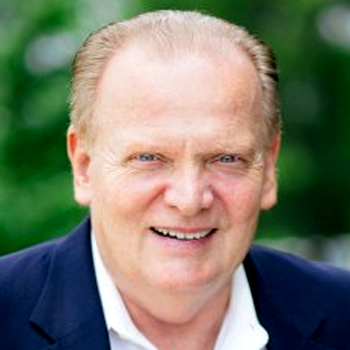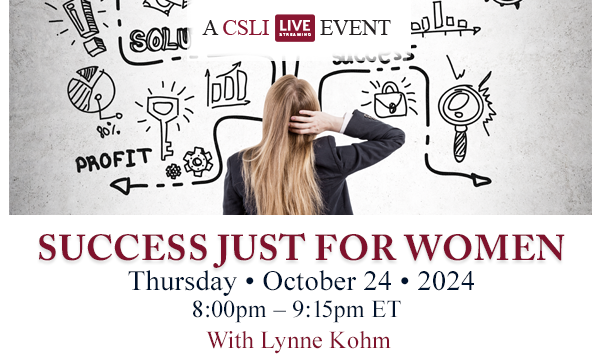Back to series


Courage
Click here to open a Print - Friendly PDF
Courage is not the absence of fear but acting despite it. In fact, you would not need courage if you did not have fear. Therefore to address the subject of courage, it is helpful to examine fear and its seemingly lesser forms: worry and anxiety.
There are many fears we face in life: fear of rejection, fear of failure, fear of disease, fear of death, fear of war, fear of terrorism, fear of bio-terrorism, and fear generated by issues in the “culture wars.” The list could go on.
Recently, I was talking to an African woman who studied law in America and now teaches jurisprudence in her home country. While back in the U.S. for a visit, she perceptively observed a noticeable shift in the mentality of Americans since September 11, 2001. She recognized a sense of fear drifting in the air, altering the psyche of the country. The contrast to life in Africa was distinct: even though there is an abundance of very real threats in Africa, the threats are so constant that you must live beyond them. Since America had now experienced an attack on its own shores, our assumed sense of safety and security is shaken—and our imaginations have taken flight.
A little saying points out the torment caused by runaway imaginations:
Worriers feel every blow
That never falls
And they cry over things
They will never lose.
Soren Kierkegaard says as well: “No Grand Inquisitor has in readiness such terrible tortures as anxiety.”
 How can we be free from this fear and have the courage to live for the truth in our times? Jesus says, “If you continue in my word, you are truly my disciples; and you will know the truth and the truth will set you free.” Jesus exhorts us to continue obeying His word as the path to knowing the truth (in an experiential way) and to freedom. This is especially true with fear, anxiety, and worry.
How can we be free from this fear and have the courage to live for the truth in our times? Jesus says, “If you continue in my word, you are truly my disciples; and you will know the truth and the truth will set you free.” Jesus exhorts us to continue obeying His word as the path to knowing the truth (in an experiential way) and to freedom. This is especially true with fear, anxiety, and worry.
Not all fear is bad. There are three kinds of fear: natural, sinful, and religious. The first and the last are in fact “good” fears. For example, natural fear has a life-preserving value. Studies have shown that people who show a lack of fear, as you might expect, live shorter lives. Natural fear prepares you for fight or flight, to fight the threat or else flee from it.
Natural fear easily becomes sinful fear. Natural fear becomes sinful fear when it becomes excessive or immoderate. This can happen when we give to someone or something the power that only God should have to help us or hurt us. For instance, when we give someone the power to rule our thoughts, determine our attitudes, or control our actions, we in effect make them a god. We then desire their approval and fear their disapproval more than God’s approval and disapproval. In this way, we can give a circumstance or a cultural threat controlling power over us.
In our culture, conspiracy theories are as American as apple pie. We are brought up on James Bond films, the Star Wars series, Robert Ludlum novels, and even some cartoons in which there is a conspiracy that threatens the world or the universe. This kind of conspiracy theory is, sad to say, found in Christian literature as well. Publishers Weekly went to a conference of Christian booksellers in 1991 and reported that a majority of the books displayed were driven by fear: fear of the culture wars, the Anti-Christ, the New Age, and other fearful attacks. It is easy for believers to talk as if they are standing on the Rock of Ages, when in fact they act as if they are standing on the last piece of driftwood. In an odd twist, their perfect fear drives out love.
The antidote for sinful fear is a healthy fear of God. Isaiah 8:11-13 addresses this conspiracy mentality: “For thus the Lord spoke to me with mighty power and instructed me not to walk in the way of this people saying, ‘You are not to say it is a conspiracy in regard to all that this people call a conspiracy and you are not to fear what they fear and be in dread of it. It is the Lord of hosts whom you should regard as holy. And He shall be your fear and He shall be your dread.’’’
In other words, we are not to allow the fear of conspiracies to control us or determine our attitudes and actions. We are to counter the lesser fear (of conspiracies) with a higher fear—the fear of God. This fear is not what Luther called a “servile” fear— the fear a prisoner might feel of a jailer who would punish any infraction with a harsh beating. It is what Luther called a “filial” fear—the fear a son or daughter might have of a loving father or mother, afraid of causing an emotional distance from the one so loved.
The fear of God is the genesis of wisdom. Proverbs 9:10 teaches, “The fear of the Lord is the beginning of wisdom.” Similarly, Proverbs 1:7 explains that, “the fear of the Lord is the beginning of knowledge.” We are exhorted to “live in the fear of the Lord always” (Prov. 23:17). The writer of Ecclesiastes, after pointing out all the things that are in vain, tells us something that is not in vain: “The conclusion when all has been heard is: fear God and keep His commandments because this applies to every person” (Eccles. 12:13). This proper kind of fear keeps us humble, reverent, and teachable. If we do not know God’s greatness, we might easily become inflated in our self-opinion. But if we know God’s infinite power, holiness, and love, we then know our own finitude and fallenness.
Jesus knew the power that fear exercised over our actions. In the parable of the talents, the servant given one talent buries it rather than investing it. Later we learn the reason: he was afraid of the Master (Matt. 25:25). Fear, Jesus knows, can stifle initiative, drain off courage, and cause a refusal to venture, to paralyze us so that we will not take risks.
 Jesus taught that worries can choke growth. In the parable of the sower, the seed that fell among the thorns is choked by the “worries and riches and pleasures of this life, and bring no fruit to maturity” (Luke 8:14). As He later explains, people can live fruitless lives because they become consumed with riches and pleasures and are tyrannized by worries—probably that their riches might be lost or stolen.
Jesus taught that worries can choke growth. In the parable of the sower, the seed that fell among the thorns is choked by the “worries and riches and pleasures of this life, and bring no fruit to maturity” (Luke 8:14). As He later explains, people can live fruitless lives because they become consumed with riches and pleasures and are tyrannized by worries—probably that their riches might be lost or stolen.
Jesus also knew that worry can lead to excessive activity and distraction. In the story about Jesus’ visit with Mary and Martha, Martha is frantic over the details of the coming meal. Mary’s lack of involvement in the preparation fuels resentment in Martha to the point that she even tries to manipulate Jesus to do her will: “…tell her to help me” (Luke 10:40). But Jesus replies, “Martha, Martha, you are worried and bothered about so many things, but only a few things are necessary, really only one, for Mary has chosen the good part….” (Luke 10:41-42). Notice that Martha’s excessive activity, motivated by worry, kept her from focusing on the truly important thing—Jesus. We too can allow ourselves to be distracted, diverted, frantically running around doing our jobs, seeking power and money, raising our kids, and even running around to ministry opportunities, perhaps being afraid of slowing down.
When fears overwhelm us, we need to stop listening to ourselves and talk to ourselves. Rather than sitting and listening to the fears and anxieties that set our imaginations sailing, we need to take hold of ourselves: “Stop! Do not think this way! Have you forgotten God’s promises in his Word? Consider these things.”
Jesus gives genuine antidotes to anxiety—not platitudes. In the film The Lion King, the animal characters sing “Hakuna Matata,” meaning “no worries.” I once asked my son Jonathan (at age 7) what “Hakuna Matata” meant. He immediately responded, “It means ‘no worries’.” Then he continued, “But Dad, Timon and Pumbaa have all kinds of worries. They are chased by tigers and burnt up by lightning bolts.” He knew that despite their carefree philosophy, the reality of life was very different.
In contrast, Jesus gives us a substantive perspective to counter our fears. In Matthew 6:25-32, He addresses anxiety by first arguing from the greater to the lesser: if God has given us life, will He not give food to sustain that life? If God has given us bodies, will He not give us clothes to put on those bodies? (Matt. 6:25) Then Jesus argues from the lesser to the greater: consider the birds: they do not plant or reap crops, yet the Father feeds them. Since you are of more value than the birds, do you not think God will feed you (v. 26)? Or consider the lilies, they do not work but the Lord clothes them gloriously (v. 28-29). The Lord even adorns the grass in the fields. If you are of more value than the lilies or the grass, do you not think God will clothe you?
You might say, “But I have seen dead birds and crushed lilies and burnt grass; what about that?” Jesus speaks to pointless anxiety in verse 27: “And which of you, by being anxious, can add a single cubit to his life span?” Adding a “single cubit” to your “life span” is a mixed metaphor, but sometimes the Bible uses a length measurement when speaking about time. Psalm 39:5 says, “Behold, Thou hast made my days as handbreadths.” In other words, my days are relatively short. Thus, Jesus’ admonition would mean that worrying cannot add a single month, week, or even second to your life time.
Often fear creates what is feared. We have all experienced moments when our fears caused the very thing we wanted to avoid—perhaps on a job interview, or a first date, or another important meeting. Fear altered your voice or caused you to act unnaturally or awkwardly. How about speaking in front of a group, the number one fear of adults: who hasn’t had their mind go blank or felt their face flush at times? Fear is not an idle enemy but one that invades our heart, mind, and body.
Love casts out fear. At one point in my life the fear of public speaking almost kept me out of the ministry. I was Elections Board Chairman my senior year in college and had to make announcements to each assembled class. I nearly got sick each time. Gradually, however, I learned to overcome it. One of the things that helped was considering the verse in I John 4:18: “perfect love casts out fear.” Fear and love are really opposites, because fear is self-centered and love is other-centered. Fear is inwardly directed and love is outwardly directed. When I had to give a sermon or teaching, I began to focus on the value of what I was going to share and how it could help those who heard. I would also pray that I would have a love for the people I was addressing. I began to see that the more love I had for people, the less I feared.
Not a spirit of fear, but of power. Another great help for me was to realize the power available to me through the work of the Holy Spirit. In II Timothy 1:7 Paul tells timid Timothy: “God has not given us a spirit of fear, but of power, and love, and a sound mind.” Each time I spoke I asked for a special filling of the Holy Spirit, an anointing so that the words I spoke would be burned on people’s hearts, minds, and consciences. For a few years, I did in-prison seminars for Prison Fellowship. I often had the sense as the prison door closed behind me that the power of the Holy Spirit—the Advocate—went before me. Even though I was there primarily to teach believers, almost always someone came to believe in Christ. In one midwestern prison, the leading Satanist of the prison came to my talk on the subject of faith. At the end of my talk, he said that he had committed his life to Christ and wondered what to do. The Holy Spirit had been at work. Since the days of the Apostle Paul—formerly the greatest persecutor of the Church—such transformations by the Spirit’s power are nothing new.
 Fear, anxiety, and worry are future-oriented emotions causing us to ask: “What if this happens? Or what about that?” We can conjure up numerous scenarios, all of which reinforce our fears and drain us of energy and life, even paralyzing us with anxiety and worry. The way to counter future-oriented emotions is by hope, biblical hope: not “I hope so,” but a “sure and steadfast” anchor for our souls (Heb. 6:19). It is faith directed towards the future grace that God promises. In Hebrews 11:1 it says, “Now faith is the assurance of things hoped for, the conviction of things not seen.” The things we hope for have not yet happened, so how can we be sure they will? The Greek word for assurance here (hypostasis) means substance; in other words, faith allows a real “taste” in the present of the things that are yet future. Faith is also the conviction of things not seen. The word conviction is the Greek word elenchus which Aristotle defines as “that which must be true and cannot be otherwise than it is.” In other words, it is an axiom. By faith that which is unseen becomes axiomatic in our lives. The unseen supernatural world becomes as real as the world we see. By hope—that is, faith directed toward the future— we can put into perspective fear, anxiety, and worry. The more we trust in God’s promise, the more we trust in the reality of the unseen world, the more our fear and anxiety is kept in check.
Fear, anxiety, and worry are future-oriented emotions causing us to ask: “What if this happens? Or what about that?” We can conjure up numerous scenarios, all of which reinforce our fears and drain us of energy and life, even paralyzing us with anxiety and worry. The way to counter future-oriented emotions is by hope, biblical hope: not “I hope so,” but a “sure and steadfast” anchor for our souls (Heb. 6:19). It is faith directed towards the future grace that God promises. In Hebrews 11:1 it says, “Now faith is the assurance of things hoped for, the conviction of things not seen.” The things we hope for have not yet happened, so how can we be sure they will? The Greek word for assurance here (hypostasis) means substance; in other words, faith allows a real “taste” in the present of the things that are yet future. Faith is also the conviction of things not seen. The word conviction is the Greek word elenchus which Aristotle defines as “that which must be true and cannot be otherwise than it is.” In other words, it is an axiom. By faith that which is unseen becomes axiomatic in our lives. The unseen supernatural world becomes as real as the world we see. By hope—that is, faith directed toward the future— we can put into perspective fear, anxiety, and worry. The more we trust in God’s promise, the more we trust in the reality of the unseen world, the more our fear and anxiety is kept in check.
We can live much of our lives emotionally in the past (guilt or anger) or in the future (fear, anxiety, and worry) rather than in the present. We can all at times be more absent than we are present. When we are emotionally absent, we are not able to love. To love requires that we be fully present for the one we love. The more we deal with past and future-oriented emotions by daily putting on faith and hope, the more present we can be and thus the more we can love. Again, only by faith and hope can we fully love.
The worst has already happened. But we might ask, “What if the worst happens?” We might imagine the worst scenario possible. But the worst has already happened: the Son of God has died on a cross. After that, all other tragedy is relativized. Paul says, “For I consider the sufferings of this present time are not worthy to be compared with the glory that is to be revealed to us.” Christ’s resurrection and thus the future glory we glimpse in his resurrection alter our view of the future. There is certainly much sorrow, grief, and pain that we have to face in this life, but if we weigh it on the scale of eternity, it is next to nothing. In Psalm 73, Asaph, after almost losing his faith in God’s goodness, comes to the affirmation, “Whom do I have in heaven but Thee? And besides Thee, I desire nothing on earth. My flesh and my heart may fail, but God is the strength of my heart and my portion forever” (Psalm 73:25-26). To say “I desire nothing on earth” is an astounding statement. It means that in comparison with having the Lord, all else fades into nothingness. Though the Psalmist continues to struggle with his “flesh” and his “heart,” he knows that God is his “portion.” What does this mean? It is easier to talk about God possessing us, but we can also affirm that we possess God. He is our portion, our possession. When we possess God, what do we have in comparison to that which we lack? I think it is true to say, “Whoever possesses God has all.”
We need to encourage each other with these things. The struggles in our personal and public lives may cause our flesh and heart to fail; thus we need the strength of others to uphold us so that we can remain faithful. Meditating on the Bible’s teachings regarding courage and fear can be a great source of help, especially if we will put these truths into practice. Then we will be freer to act courageously. While fear, worry, and anxiety will not likely be eliminated entirely, we can bring them under control day by day.
I heard the story of a pastor who was staying up late worrying about a situation in his church. He wrestled in his mind: “If this happens, then I will do that, but if the other happens, then I will change my decision. If a third scenario develops....” On and on he fretted. In the midst of his turmoil, he heard the Lord speak to him, “Why don’t you sleep now; I will be up all night.”

Arthur W. Lindsley
Senior Fellow for Apologetics, CSLIArthur W. Lindsley is the Vice President of Theological Initiatives at the Institute for Faith, Works, & Economics. He has served at the C.S. Lewis Institute since 1987 both as President until 1998 and currently as Senior Fellows for Apologetics. Formerly, he was director of Educational Ministries at the Ligonier Valley Study Center, and Staff Specialist with the Coalition for Christian Outreach. He is the author of C.S. Lewis's Case for Christ, True Truth, Love: The Ultimate Apologetic, and co-author with R.C. Sproul and John Gerstner of Classical Apologetics, and has written numerous articles on theology, apologetics, C.S. Lewis, and the lives and works of many other authors and teachers. Art earned his M.Div. from Pittsburgh Theological Seminary and a Ph.D. in Religious Studies from the University of Pittsburgh.
 COPYRIGHT: This publication is published by C.S. Lewis Institute; 8001 Braddock Road, Suite 301; Springfield, VA 22151. Portions of the publication may be reproduced for noncommercial, local church or ministry use without prior permission. Electronic copies of the PDF files may be duplicated and transmitted via e-mail for personal and church use. Articles may not be modified without prior written permission of the Institute. For questions, contact the Institute: 703.914.5602 or email us.
COPYRIGHT: This publication is published by C.S. Lewis Institute; 8001 Braddock Road, Suite 301; Springfield, VA 22151. Portions of the publication may be reproduced for noncommercial, local church or ministry use without prior permission. Electronic copies of the PDF files may be duplicated and transmitted via e-mail for personal and church use. Articles may not be modified without prior written permission of the Institute. For questions, contact the Institute: 703.914.5602 or email us.
-
Recent Podcasts
The Faith of Francis Schaeffer
by Arthur W. Lindsley, Aimee Riegert on October 18, 2024Francis August Schaeffer was born on January 30,...Read More
-
A Cumulative Case for God – Dr. John Studebaker’s story
by John Studebaker on October 11, 2024
-
C.S. Lewis on Faith and Reason
by Aimee Riegert, Arthur W. Lindsley on October 4, 2024
-
Recent Publications
Should Christians Be Involved with Politics?
by Kerry A. Knott on October 1, 2024In recent years it seems like politics has...Read More
-
Isn ’t Atheism Based on Scientific Fact Whereas Christianity is Based on “Faith”?
by Cameron McAllister on September 1, 2024
-
A Christian Response to Anti-Semitism
by Darrell Bock, Randy Newman, Thomas A. Tarrants on August 15, 2024
0
All Booked
0.00
All Booked
0.00
All Booked
23123
GLOBAL EVENT: Success Just For Women with Lynne Marie Kohm, J.D. 8:00 PM ET
https://www.cslewisinstitute.org/?event=global-event-success-just-for-women-with-lynne-marie-kohm-j-d-800-pm-et&event_date=2024-10-24®=1
https://www.paypal.com/cgi-bin/webscr
2024-10-24

Next coming event
Days
Hours
Minutes
Seconds
GLOBAL EVENT: Success Just For Women with Lynne Marie Kohm, J.D. 8:00 PM ET
On October 24, 2024 at 8:00 pmSpeakers

Arthur W. Lindsley
Senior Fellow for Apologetics, CSLI
Team Members

Arthur W. Lindsley
Senior Fellow for Apologetics, CSLIArthur W. Lindsley is the Vice President of Theological Initiatives at the Institute for Faith, Works, & Economics. He has served at the C.S. Lewis Institute since 1987 both as President until 1998 and currently as Senior Fellows for Apologetics. Formerly, he was director of Educational Ministries at the Ligonier Valley Study Center, and Staff Specialist with the Coalition for Christian Outreach. He is the author of C.S. Lewis's Case for Christ, True Truth, Love: The Ultimate Apologetic, and co-author with R.C. Sproul and John Gerstner of Classical Apologetics, and has written numerous articles on theology, apologetics, C.S. Lewis, and the lives and works of many other authors and teachers. Art earned his M.Div. from Pittsburgh Theological Seminary and a Ph.D. in Religious Studies from the University of Pittsburgh.




